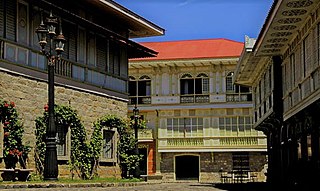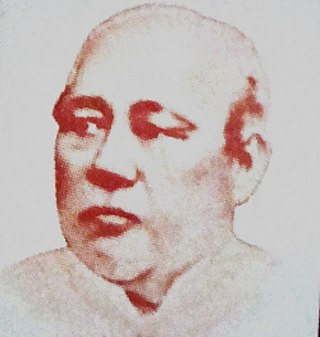Related Research Articles

Metropolitan Manila, commonly shortened to Metro Manila and formally the National Capital Region, is the capital region and largest metropolitan area of the Philippines. Located on the eastern shore of Manila Bay, the region lies between the Central Luzon and Calabarzon regions. Encompassing an area of 636.00 km2 (245.56 sq mi) and with a population of 13,484,462 as of 2020, it consists of sixteen highly urbanized cities: Manila—the capital city—Caloocan, Las Piñas, Makati, Malabon, Mandaluyong, Marikina, Muntinlupa, Navotas, Parañaque, Pasay, Pasig, Quezon City, San Juan, Taguig, and Valenzuela, along with one independent municipality, Pateros. As the second most populous and the most densely populated region in the Philippines, it ranks as the 9th most populous metropolitan area in Asia and the 6th most populous urban area in the world.

Negros Occidental, officially the Province of Negros Occidental, is a province in the Philippines located in the Negros Island Region. Its capital is the city of Bacolod, of which it is geographically situated and grouped under by the Philippine Statistics Authority, but remains politically independent from the provincial government and also one of the two regional centers in Negros Island Region. It occupies the northwestern half of the large island of Negros, and borders Negros Oriental, which comprises the southeastern half. Known as the "Sugarbowl of the Philippines", Negros Occidental produces more than half the nation's sugar output.

Taguig, officially the City of Taguig, is a coastal city located in eastern shores of Metro Manila, the capital region of the Philippines. It is the fifth-most populous city in the country with a population of 1.2 million people. The city is one of the Philippines' cultural, financial, high-tech, entertainment and media centers with significant influence on commerce, health care, research, technology, education, politics, tourism, dining, art, fashion, and sports. Taguig is also an important center for the country's international diplomacy, hosting several embassies. The city also home to the headquarters of several major multinational corporations. Taguig has the fourth largest skyline in the Philippines, with 289 high-rises, 80 of which exceed 100 m (328 ft).
The De La Salle Canlubang, currently the De La Salle University – Laguna Campus, was a private Catholic basic and higher education institution and a member institution of De La Salle Philippines run by the Institute of the Brothers of the Christian Schools in Biñan, Laguna, Philippines. It is located right across the Laguna Technopark district. The campus, which was acquired on 2003, is a 50-hectare (120-acre) prime property. Part of this property was donated by the family of the late National Artist for Architecture Leandro Locsin.

Arquitectonica is an international architecture, landscape architecture, interior design, and urban planning design firm headquartered in Miami, Florida’s Coconut Grove neighborhood. The firm also has offices in ten other cities throughout the world. Arquitectonica began in 1977 as an experimental studio founded by Peruvian architect Bernardo Fort-Brescia, Laurinda Hope Spear, Andrés Duany, Elizabeth Plater-Zyberk, and Hervin Romney.

The Minor Basilica and Parish of San Sebastian, also known as the Shrine of Our Lady of Mount Carmel and commonly known as San Sebastian Church or San Sebastian Basilica, is a minor basilica of the Roman Catholic Church in Manila, Philippines. It is under the jurisdiction of the Archdiocese of Manila.

De La Salle Philippines (DLSP), established in 2006, is a network of Lasallian educational institutions within the Lasallian East Asia District established to facilitate collaboration in the Lasallian Mission and the promotion of the Spirit Of Faith, Zeal For Service and Communion In Mission. There are currently sixteen Lasallian Educational Institutions in the Philippines. De La Salle Philippines replaced the De La Salle University System which was established under the presidency of Br. Andrew Gonzalez FSC in 1987 as a response to the rapid expansion of Lasallian educational institutions nationwide. De La Salle Philippines is a member of a network of over 1,100 Lasallian educational institutions in 80 countries.
Eduardo de los Santos Castrillo was a renowned Filipino sculptor.
Nathan Clifford Ricker, D.Arch was a professor and architect known for his work at the University of Illinois. He was born on a farm near Acton, Maine June 24, 1843. In 1875, he was married to Mary Carter Steele of Galesburg, Illinois. Mary Steele graduated with honors from the University of Illinois in 1875. His only child, Ethel, was born in 1883. He died on March 19, 1924.
2007 in the Philippines details events of note that happened in the Philippines in the year 2007.

The architecture of the Philippines reflects the historical and cultural traditions in the country. Most prominent historic structures in the archipelago are influenced by Austronesian and American architectures.

Ayala Malls is a retail subsidiary of real estate company Ayala Land, an affiliate of Ayala Corporation. Founded in 1988, Ayala Malls owns a chain of large shopping malls, all located in the Philippines. Ayala Malls is one of the largest shopping mall retailer in the Philippines, along with SM Supermalls and Robinsons Malls.
The AIA Philippines Life and General Insurance Company Inc.,, is an insurance company based in the Philippines. As of 2020, it is one of the larger life insurance companies in the country by assets and net worth.

Ambrosio Rianzares Bautista y Altamira, also known as Don Bosyong, was a Filipino lawyer and author of the Declaration of Philippine Independence. A distant relative to the Rizal family and the Bonifacio family, Bautista often gave advice to José Rizal, a Filipino nationalist, while studying in Manila.
The Icone Tower, also known as the BCDA Iconic Building, is a proposed skyscraper at the Bonifacio Global City in Taguig, Metro Manila, Philippines.
EcoTower is a 32-story edifice with 25 office floors located in Bonifacio Global City, Metro Manila, Philippines. Classified as a Grade A building, EcoTower's construction began in 2011 and was completed in January 2013. The skyscraper has a total commercial and office space area of 29,000 square meters with a typical floor plate of 1,250 square meters. It was designed by Jose Siao Ling & Associates and built by Monolith Construction. In the first two months of 2013, there is highest demand for office space in EcoTower, particularly from BPO firms as it is the only new building with accreditation from the Philippine Export Zone Authority (PEZA) at the time.

The Cebu–Cordova Link Expressway (CCLEX), also known as the Cebu–Cordova Bridge and the Third Cebu–Mactan Bridge, is an 8.9-kilometer (5.5 mi) toll bridge expressway in Metro Cebu, Philippines. The bridge connects the South Road Properties in Cebu City in mainland Cebu and Cordova on Mactan island. Crossing the Mactan Channel, the bridge is the third road link between Cebu and Mactan islands and the first between Cebu City and Cordova. It is the longest sea-crossing bridge in the Philippines, surpassing the 2-kilometer (1.2 mi) San Juanico Bridge between Samar and Leyte, as well as Marcelo Fernan Bridge as the longest cable-stayed bridge in the Philippines. It also surpassed the 5-kilometer (3.1 mi) Candaba Viaduct of North Luzon Expressway (NLEX) connecting the provinces of Pampanga and Bulacan for being the longest bridge in the Philippines upon its completion on October 5, 2021.
The 2017 season is Kaya FC—Makati's 1st season in the top flight of Philippines football.
Peter G. Rowe is an architect, researcher, author, and educator. Rowe is currently the Raymond Garbe Professor of Architecture and Urban Design and the Harvard Distinguished Service Professor at the Harvard University Graduate School of Design, where he has held various teaching positions since 1985. He is also the chairman and co-founder of the New York-based practice SURBA – Studio for Urban Analysis, founded in 2012.
References
- ↑ "Carlos Arnaiz | Pratt Institute". www.pratt.edu. Retrieved 2021-10-30.
- ↑ alpharhochi.org, Alpha Rho Chi | (2014-02-06). "Alpha Rho Chi Bronze Medal – 2003 Recipients | Alpha Rho Chi". www.alpharhochi.org. Retrieved 2021-10-30.
- ↑ Magazine, Wallpaper* (2016-06-08). "CAZA". Wallpaper*. Retrieved 2021-10-30.
- ↑ "Ones to Watch". Architectural Digest. 2016-03-09. Retrieved 2021-11-02.
- ↑ Logarta, Margie T. (2019-08-16). "Mall maker". The Manila Times. Retrieved 2021-11-02.
- ↑ "CAZA's 100 Walls Church is surrounded by staggered walls". Dezeen. 2014-02-25. Retrieved 2021-11-02.
- ↑ "Next Progressives: CAZA". www.architectmagazine.com. Archived from the original on 2015-03-20. Retrieved 2021-10-30.
- ↑ "CAZA's City Center Tower Opens in the Philippines". Contract Design. Retrieved 2021-10-30.
- ↑ "Bench Tower by CAZA Architects – aasarchitecture" . Retrieved 2021-10-30.
- ↑ "'A church of 100 walls' rises in Cebu". Inquirer Lifestyle. 2012-12-11. Retrieved 2021-11-02.
- ↑ "CAZA offers 'spiritual inclusiveness' with la salle church in binan city, the philippines". designboom | architecture & design magazine. 2021-03-09. Retrieved 2021-10-30.
- ↑ 4dprime.com; www.4dsites.com. "First Combined Hospital And Trauma Center For Philippines | Global Growth Markets". www.ggmkts.com. Retrieved 2021-10-30.
{{cite web}}: CS1 maint: numeric names: authors list (link) - ↑ IV, Franz Sorilla. "MET Museum: Its 45-Year-History and a Sneak Peek of its New Space at BGC". Tatler Asia. Retrieved 2021-10-30.
- ↑ "When Urbanization Comes to Ground". Harvard Graduate School of Design. Retrieved 2021-10-30.